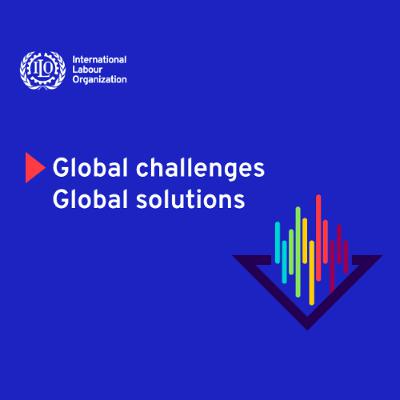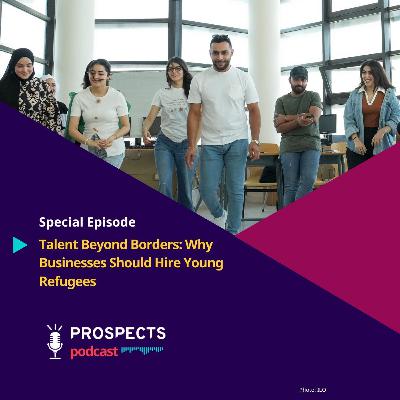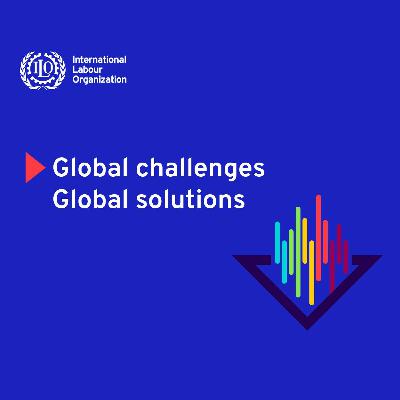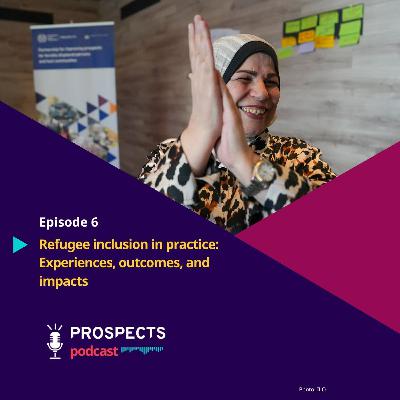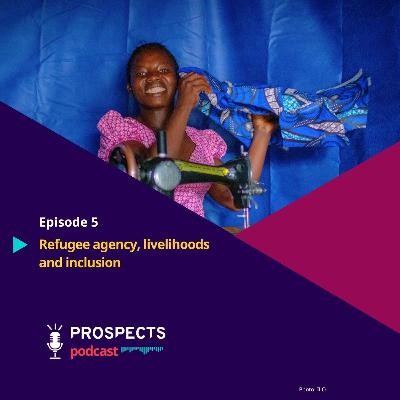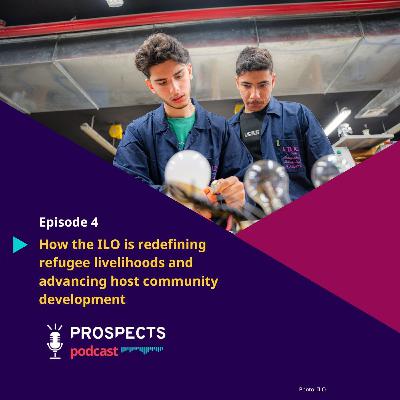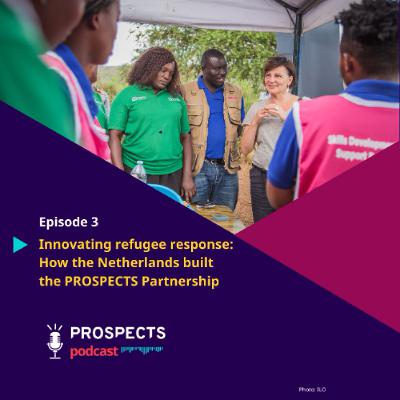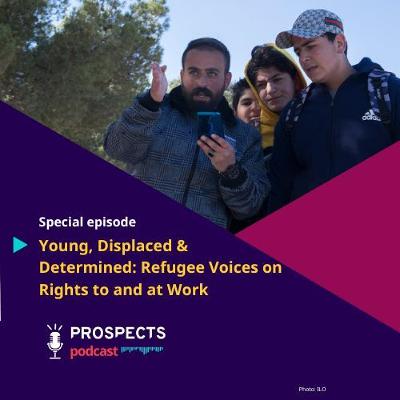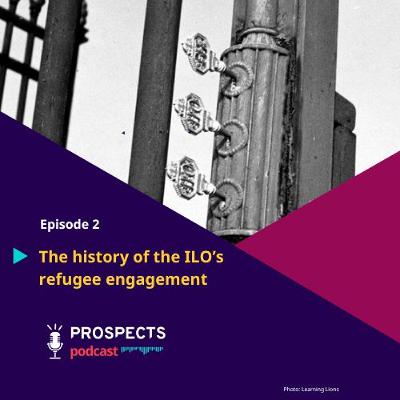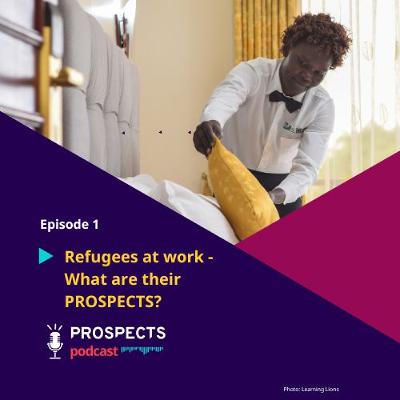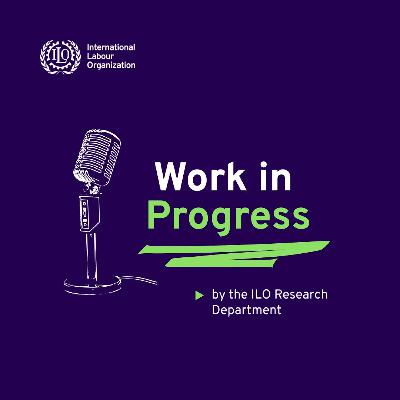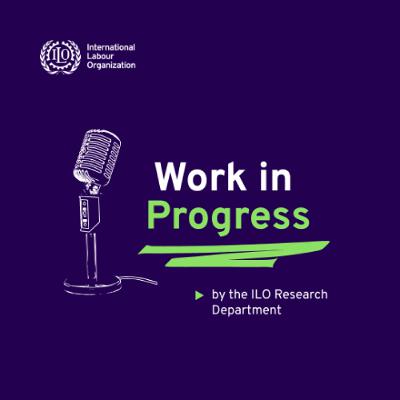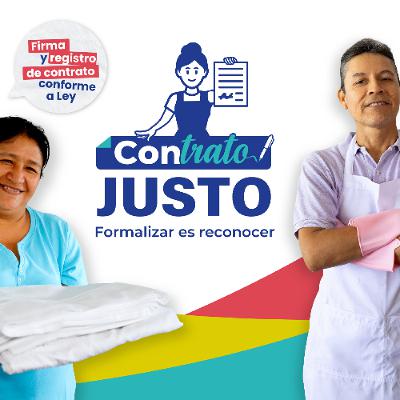Discover World of Work podcasts by the ILO
World of Work podcasts by the ILO

World of Work podcasts by the ILO
Author: International Labour Org.
Subscribed: 42Played: 253Subscribe
Share
© All rights reserved
Description
The International Labour Organization (ILO) is a specialized agency of the United Nations and is devoted to promoting social justice and internationally recognized human and labour rights, pursuing its founding mission that labour peace is essential to prosperity.
Today, the ILO helps advance the creation of decent work and the economic and working conditions that give working people and business people a stake in lasting peace, prosperity and progress. Its tripartite structure provides a unique platform for promoting decent work for all women and men.
Its main aims are to promote rights at work, encourage decent employment opportunities, enhance social protection and strengthen dialogue on work-related issues.
Today, the ILO helps advance the creation of decent work and the economic and working conditions that give working people and business people a stake in lasting peace, prosperity and progress. Its tripartite structure provides a unique platform for promoting decent work for all women and men.
Its main aims are to promote rights at work, encourage decent employment opportunities, enhance social protection and strengthen dialogue on work-related issues.
81 Episodes
Reverse
The latest episode of the “Global Challenges - Global Solutions” podcast explores the transformative role of Big Data in shaping policies and informing decision-making in today’s interconnected world. Big Data is different from traditional data, covering a wider range of information, and can include insights gathered from mobile phone data This new tool for powering economic development and informing policymaking can improve people’s lives and address the growing need for new and decent jobs. However, Big Data also raises concerns or questions around privacy, data sources and governance.
In this podcast two experts on Big Data, Veronica Escudero, Senior Economist and Lead of the Skills, Labour Market Policies and Policy Evaluation Team of the ILO Research Department, and Sveta Milusheva, Senior Economist in the Development Impact department at the World Bank and co-lead of the Bank’s Global Data Facility – Mobile Phone Data for Policy (GDF–MPD) Program, explain how Big Data works and its impacts on the world of work.
This PROSPECTS podcast episode explores how the private sector can drive economic inclusion of young refugees by expanding access to decent work and protecting their rights at work. Roman Bojko, Human Rights and Social Impact Leader at Ingka Group shares more about the company’s global Skills for Employment initiative and lessons learned from integrating refugee talent across 26 countries. The conversation highlights how hiring refugees is not just the right thing to do - it’s also good for business, fostering innovation, resilience, and inclusion in the workplace.
Is trade good or bad for jobs? For years, ILO research has shown how international trade can be an engine of growth and creating decent jobs. But things are changing. The realities of trade and investment today are far more complicated than they used to be, and globalization has had an uneven impact. So, does it still mean that trade remains a viable strategy for promoting growth and reducing poverty while creating decent work opportunities men and women? In this podcast, we explore the influence of trade and investment on jobs in today’s world and some policy options with Christophe Ernst, ILO expert on trade and investment.
Investments in skills are instrumental in achieving social and economic goals. From the perspective of the 2030 Sustainable Development Goals, skills are important to achieving SDG 8 on decent work and economic growth, SDG 4 which includes TVET, and others.
Be that as it may, levels of financing of skills and lifelong learning remain inadequate and not in tune with national development needs. The national financing gap for SDG4 during the period 2023-30 for example is large and growing in low- and middle-income countries.
The importance of skills will be reaffirmed at the Second World Summit for Social Development in November 2025 that builds on the 10 Commitments of the first Social Summit in 1995 and aims at accelerating poverty eradication and promoting full employment, decent work, and social inclusion.
So, can we bridge the investment divide? In this podcast, we address these issues, specifically the issue of financing skills and lifelong learning for economic and social development, with our guests Jean-Francois Klein, ILO Employment Policy advisor, and Pedro Moreno da Fonseca, ILO Technical Specialist on Lifelong Learning.
In this sixth episode of Refugees at work – What are their prospects?, we explore how the Humanitarian-Development-Peace Nexus (HDPN) is reshaping the international refugee response. Speakers, Svein Erik Stav and Tewodros Aragie Kebede share research findings and field experience from Uganda, Ethiopia, Jordan and Colombia, where new policies have expanded refugee access to work and fostered economic inclusion.
The discussion highlights the positive impacts of granting refugees the right to work, the importance of aligning humanitarian and development policies, and the need to adapt Nexus models to local realities.
With insights into both successes and ongoing constraints, the episode underscores how refugees can move from dependency to self-reliance when given the right opportunities — benefiting not only themselves but also host communities and national economies.
The majority of the world’s refugees live in countries with fragile economies, where opportunities for employment and self-reliance are often limited. With displacement lasting more than a decade on average, the question of how refugees can build sustainable livelihoods has become increasingly urgent.
In this fifth episode of Refugees at work – What are their Prospects?, Professor Alexander Betts and Bisimwa Mulemangabo discuss how refugees navigate labour markets, the barriers they face, and the innovative ways they create livelihoods.
The conversation explores the diversity of refugee economies, from small-scale entrepreneurship to professional employment, and highlights how policies, host community dynamics, and private sector engagement can shape outcomes.
Crucially, the discussion emphasizes the role of refugee agency — refugees’ own voices, choices, and aspirations — in designing effective and lasting solutions. By centring refugees as economic actors rather than passive recipients of aid, the episode points to pathways that can foster dignity, inclusion, and shared prosperity for both refugees and host communities.
This episode traces the ILO’s long history of engagement in displacement contexts, from its early work in the aftermath of the World Wars to its leadership today in promoting decent work for refugees and host community members. Nick Grisewood explains how the Syrian crisis, the New York Declaration, and the Global Compact on Refugees shaped the ILO’s renewed involvement and laid the foundation for the PROSPECTS Programme.
At the heart of the discussion is the importance of labour market inclusion. Nick outlines how PROSPECTS brings together humanitarian and development actors, host governments, and the private sector to support more inclusive economies and societies. By addressing barriers such as work permit bottlenecks, skills mismatch, and onerous business registration procedures, the programme supports refugees and host communities to access sustainable livelihoods, reduce vulnerability, and contribute to national development.
The third episode of the Refugees at Work series turns to the critical role of donors in advancing inclusive and sustainable responses to forced displacement. Ana Uzelac reflects on how the Netherlands has pioneered new approaches through the PROSPECTS partnership, shifting from short-term humanitarian aid to multi-annual development financing that prioritizes refugee self-reliance and host community resilience. The conversation explores what sets PROSPECTS apart from traditional donor instruments, the added value of joint programming among international organizations, and the legacy such models can leave for policy, practice, and the lives of refugees and their hosts.
This PROSPECTS podcast episode explores young refugees’ rights to and at work. Despite international commitments recognizing their right to decent work, refugee youth continue to face legal, political, and practical barriers to full economic inclusion. Hasan Almatroud, a young Syrian refugee leader and Programme Coordinator for Amala Education in Jordan, and Shadya Abduljabbar, a Yemeni refugee in Ethiopia and Founder of Ethio Friends Foundation discuss their experiences, the challenges of navigating the labour market, and the importance of protecting and promoting youth rights at work.
The number of refugees worldwide has doubled in the past decade to 32 million, making forced displacement one of the defining challenges of our time. Yet the struggle to balance humanitarian response, labour market realities, and long-term development is not new.
In this second episode of Refugees at Work – What Are Their Prospects?, we speak with Katy Long about the ILO’s 100-year history navigating refugee and migration issues. From the League of Nations’ response to Russian refugees in the 1920s to the Cold War politics that reshaped the international system, the conversation reveals surprising continuities and enduring challenges.
Together, they discuss how historical approaches to employment, migration, and displacement continue to shape today’s policy choices — and what bold, creative solutions may be needed to ensure refugees can fully contribute to economic and social development in their host communities.
The first episode in the series provides a comprehensive overview of the evolving dynamics of forced displacement and their implications for labour markets and development policy in host countries. Professor Zetter outlines key trends, including the increasingly protracted nature of refugee situations, the shift from camps to urban settlements, and the increasing importance of labour market access.
The discussion highlights how the Humanitarian-Development-Peace Nexus and initiatives such as the PROSPECTS partnership can foster more coherent, inclusive, and sustainable responses, positioning refugees not only as beneficiaries of assistance, but also as active contributors to economic and social development.
ILO Senior Researcher Pawel Gmyrek joins Manjula Selvarajah, technology columnist and host at CBC Radio One (Canada), to unpack the findings of a new ILO Working Paper on generative AI and jobs. The conversation explores how GenAI is transforming the world of work, the methodology behind the ILO’s refined global exposure index, and what policymakers, workers, and employers should keep in mind as the technology evolves.
🔗 Read the full paper: https://www.ilo.org/publications/generative-ai-and-jobs-refined-global-index-occupational-exposure
What happens when algorithms — not people — decide who gets hired, promoted, or assigned the night shift?
In this debut episode of Work in Progress, Alessandro from the ILO Research Department speaks with Nikolai Rogovsky, Senior Economist at the ILO, about how artificial intelligence is transforming human resource management — and what it means for fairness, dignity, and the future of work.
With nearly 30 years at the ILO and a PhD from Wharton, Nikolai unpacks insights from ILO Working Paper No. 95, exploring how companies are using AI in hiring and workforce optimization — and the risks this poses to decent work.
To read the paper discussed in this episode, visit:
https://www.ilo.org/publications/artificial-intelligence-human-resource-management-challenge-human-centred-1
Work in Progress is a podcast from the ILO Research Department, sharing early ideas and behind-the-scenes perspectives on the changing world of work.
Things should be looking good for young people in the world of work, but they’re not. While unemployment among young workers between 15 and 24 has recovered from the impact of the Covid-19 pandemic, there’s a growing epidemic of unhappiness among those workers in both the developed and now the developing world. So, what is to be done? This podcast asks David Blanchflower, a professor at Dartmouth College, renowned labour economist and recognized expert on youth employment, what can be done.
In the past half decade, the world of work has faced unprecedented challenges in the form of a global pandemic, social, political and economic crises, the explosive growth of Artificial Intelligence, and an increase in destructive climate events, among others.
Meeting these challenges will require policies that support SDG 8 on decent jobs and economic growth and help advance the broader objectives of the 2030 Agenda for Sustainable Development.
So how do we address these policy and macroeconomic challenges while ensuring that employment policies help bridge jobs and economic growth, address broader economic realities and protect labour rights? In this podcast, ILO Employment Policy Director Sangheon Lee and Gilad Isaacs, Executive Director at the Institute for Economic Justice (IEJ) in South Africa offer their views.
Campaña para promover la formalización y el reconocimiento social de las trabajadoras del hogar en el Perú
Campaña para promover la formalización y el reconocimiento social de las trabajadoras del hogar en el Perú
Campaña para promover la formalización y el reconocimiento social de las trabajadoras del hogar en el Perú
Can Nature-based Solutions help us address environmental challenges, while laying the groundwork for creating millions of new jobs? A report by the ILO, the UN Environment Programme and the International Union for Conservation of Nature titled “Decent Work in Nature-based Solutions (NbS) says NbS has the potential to add up to 32 million jobs by 2030 to the already more than 60 million working to protect, and restore and sustainably use natural resources with the greatest gains in Africa, Latin America and the Arab States. At the same time, NbS will also require new skills training and reskilling of some workers. In this podcast, two lead editors of the report, Maikel Lieuw-Kie-Song, Senior Technical Specialist of the ILO Employment Policy Department, and Rowan Palmer, Programme Officer in the United Nations Environment Programme’s Economic and Trade Policy Unit explain.
Good employment policies underpin efforts to create more and better jobs, and help reduce inequalities and poverty, and empower people, especially women, young people and the most vulnerable such as people with disabilities. What is more, these polices also help address decent work deficits and are critically important to the realization of the 2030 Sustainable Development Goals, specifically SDG 8, on promoting sustainable economic growth, full and productive employment, and decent work for all. In this podcast, Juan Chacaltana, ILO Senior Employment Policies Specialist in the Employment Policy Department, and Alina Game, Technical Officer and GIS (Geographic Information Systems) expert, explain how Employment Impact Assessments involving a variety of tools for evidence-based policy development can help achieve these goals.


